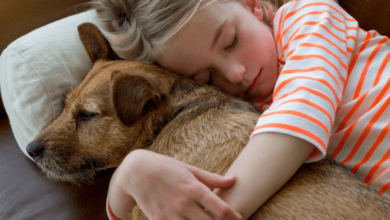Your senior pet needs special care – here are some guidelines to help you

Everyone knows that ageing is a normal part of life, and unfortunately, at some point, even your pet becomes a senior and needs special care. As expected, an adult pet has different needs than a young one, and you must learn how to make their life more comfortable.
Similarly to humans, when pets age, they partially or totally lose sight and hearing, become less mobile, and are prone to more health issues. However, you shouldn’t see this as a death sentence for your furred buddy because if cared for properly, they can live long golden years.
It’s important to highlight that not all pets are considered seniors at the same age. You’ll definitely notice the first signs of ageing and know when it’s the moment to talk with your veterinarian about changes in your lifestyle.
Here are some recommendations on how to keep your senior pet happy, healthy, and strong in the years to come.
Learn your pet’s habits
Your pet has specific habits, and you’ll easily learn them as they’re growing up. However, veterinarians state that some of these habits change as the pets get older, and it’s crucial to observe how they evolve because they might point out some issues. Keep a close eye on any changes in their sleeping patterns, appetite, physical activity, and the frequency with which they go potty. Report to the vet any changes you notice or suspect of. The doctor will evaluate their health and be able to tell you if the changes are only age-related signs or if they could mean something else.
Visit the vet regularly
As a devoted pet parent, you most likely know that you must take your furred baby to the vet regularly. However, as they age, you might have to schedule more frequent check-ups to ensure they’re healthy. Senior pets are more likely to develop illnesses, and often the symptoms aren’t noticeable in the early stages. However, the vet will take particular tests and diagnose any health problem affecting your pet. Additionally, pets, especially cats, mask their pain and discomfort, so you won’t be able to notice they’re suffering from something until it’s unbearable for them. An early diagnosis increases their chances of recovery, so visit the vet twice a year for a complete check-up.
Change their food
A senior pet has specific health needs, and therefore, you should change their food accordingly. Luckily the animal feed industry meets all pets’ needs and provides you with countless options for a senior pet’s diet. However, before changing their food, consult with their veterinarian to ensure that you switch to something that offers them the necessary nutrients. There are no standard diets that work for all pets, and only the veterinarian who knows their health history can recommend what kind of food will suit their needs better. Ask the vet during your next check-up if your pet should continue with their regular food or if you should buy something to support their kidneys, joints, or cardiovascular system better.
Suppose they recommend altering the present pet’s diet; you should have a look at the pet food processing to understand how the ingredients added to the food change after being processed and put together. While some products might work great for your neighbour’s pet, yours might need a more specific diet.
Keep them active
No matter if you are a cat or dog parent, you must encourage them to stay active because, as their age, they tend to become more sedentary. Sometimes they refuse to engage in physical activities as before because they experience pains and aches. If you notice a change in their physical activity habits, make sure to take them to the vet, so they can evaluate their health state. While it’s tempting to transform your pet into a companion that joins you on the couch for a Netflix series, you should keep in mind that exercising is vital for their health. Just like you, they benefit from staying active and moving.
Exercising promotes circulation, helps them preserve their muscle mobility and mass, and maintains their healthy metabolism. Discuss with the doctor the kind of physical activity proper for your pet, according to their age and health.
Adapt the environment to your pet’s needs
As mentioned earlier, senior pets’ needs vary. However, most of them need environmental changes to feel more comfortable during their golden years, and you should research to understand how you must alter the surrounding space to fit their needs. You might have to move their belongings to the ground floor because their joints ache when they go up the stairs. Or you might have to take some items out of their way and clear more floor space because they bump into them. However, you don’t want to change things suddenly if they suffer from eyesight or cognitive decline issues because they’ll find it disturbing.
Common health issues pets experience as they age
Think about your pet as a human; their health issues get far and wide as they age. You can expect your pet to find it difficult to control their bladder, walk, and do many things they did before. Senior pets usually experience mobility problems, behavioural changes, and bladder issues and find it more difficult to regulate their body temperature.
The first signs of ageing are:
– Decreased alertness
– Weight loss or gain
– Sleeping more
– Behavior or attitude changes
– Hesitancy to climb the stairs, jump, or run
– Sore joints
– Stiff limbs
– lack of interest in daily exercise
– limping
Final words
Not all pets are the same. Hence some show ageing signs later than others. What is certain is that they all get old at some point, and you should be prepared to meet their new needs. As they get into their golden years, they’ll find walking more difficult, have less energy, and even develop some health issues. It might sound scary, but you’ll definitely adapt to their new needs.





